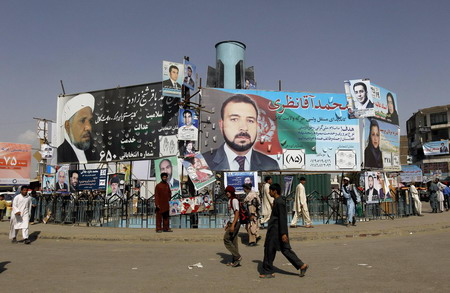Asia-Pacific
Taliban vow to disrupt Afghan election
(Agencies)
Updated: 2010-09-06 10:18
 |
Large Medium Small |
|
 Afghan people walk at a road decorated with posters and hoardings of people contesting parliament elections, in Kabul September 4, 2010. [Agencies] |
Graft and cronyism are also major concerns ahead of the vote after last year's fraud-marred presidential election, in which a third of votes for Karzai were thrown out as fake.
The U.N.-backed Electoral Complaints Commission (ECC) said it was concerned some public officials were using their positions to help certain unidentified candidates and urged the government to protect the poll's impartiality and integrity.
Abdullah withdrew from a second round of voting in last year's presidential ballot after the ECC found evidence of widespread fraud and ballot stuffing.
"The (ECC) should take serious actions in this regard," Abdullah said. "I will urge the people of Afghanistan to report on this. It is your destiny that will be decided."
The ECC has been weakened this year, with only two of its three commissioners U.N.-appointed foreigners instead of the three foreigners it had last year.
The commission said on Sunday 76 candidates had been disqualified so far for a range of reasons, from improper registration to links with warlords and private militias.
About 2,500 candidates are running for 249 seats in the Wolesi Jirga, or lower house of parliament, in Afghanistan's second parliamentary vote since the Taliban were ousted.
The issue of corruption frequently strains ties between Karzai and his Western backers, and the vote is also seen as a test of Karzai's credibility.
Many in Washington believe rampant corruption significantly weakens the central government and hampers efforts to build up Afghanistan's security forces so that they can eventually take over from NATO-led forces, allowing foreign troops to leave.
Long queues have formed outside branches of Kabulbank, Afghanistan's top private lender, since it emerged last week that the bank's top two executives had been replaced amid media allegations of corruption.
Karzai's government has assured the bank's depositors, which include 250,000 state employees, that deposits have not been lost and that the directors resigned to meet new regulations.



